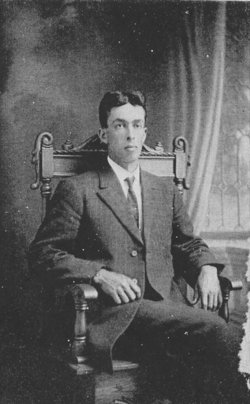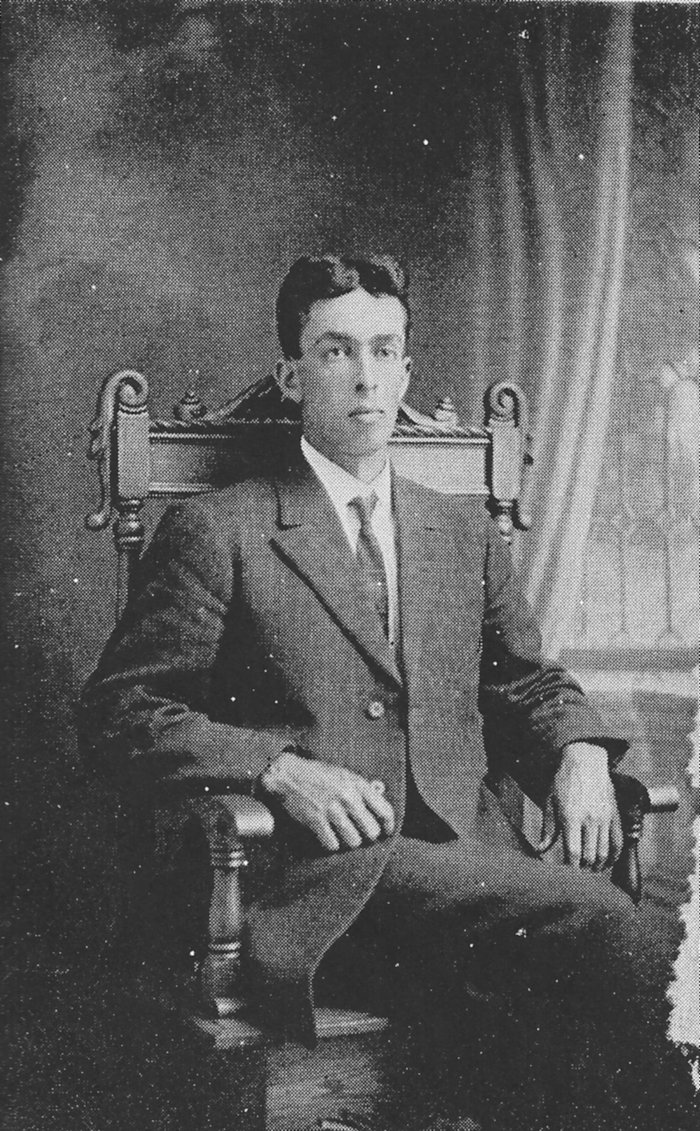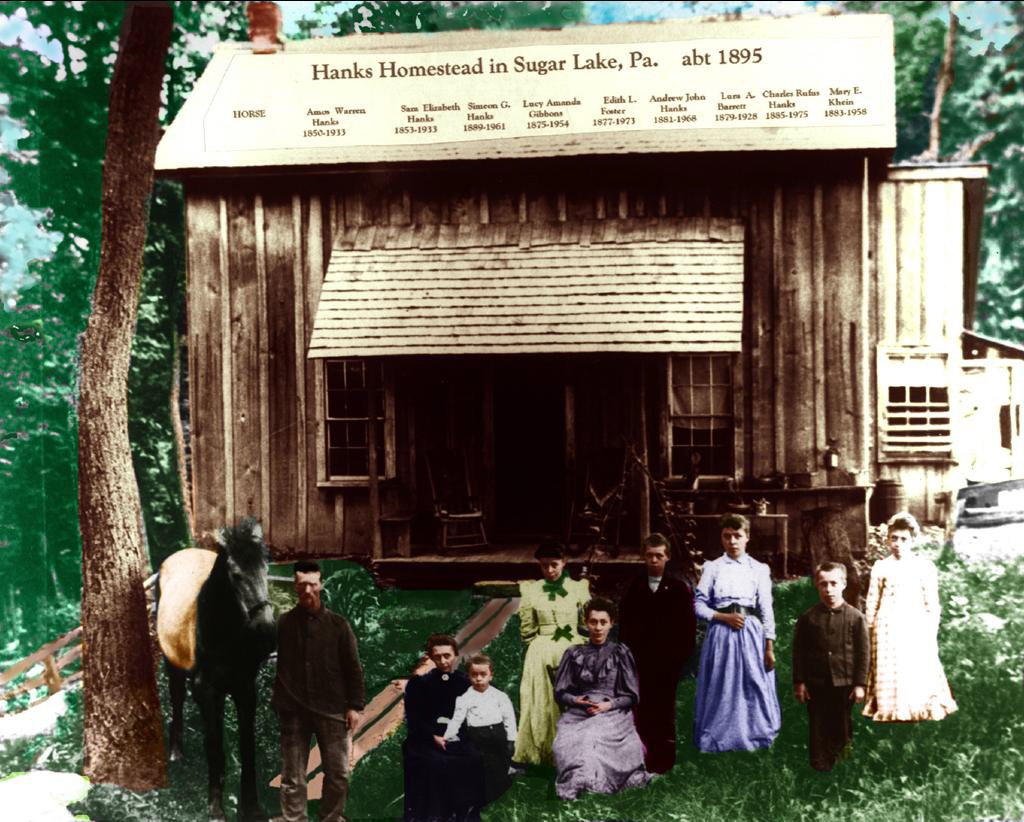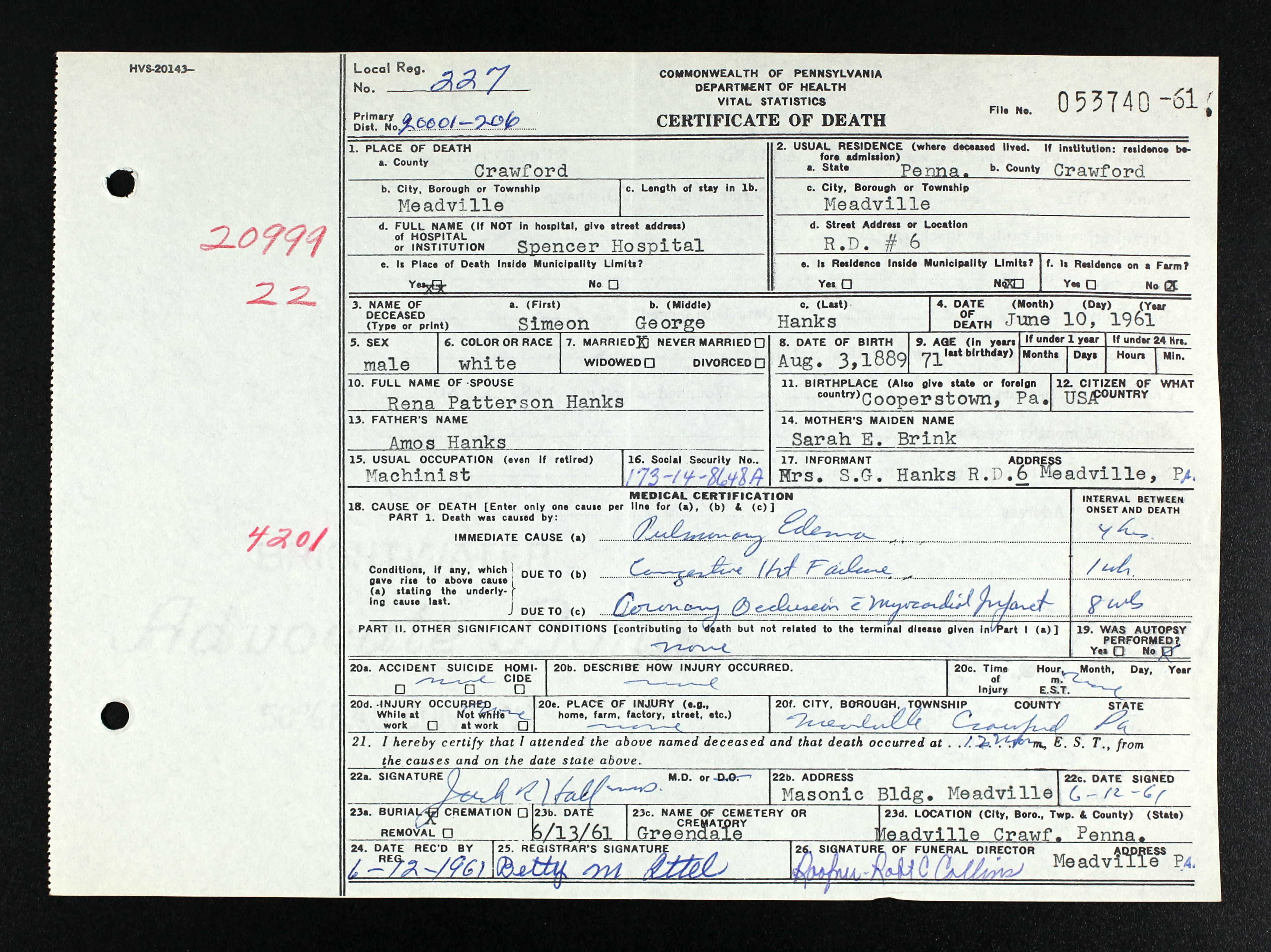It seems that we always had a black glass name plaque which hung by our front door wherever we lived and it read "S. G. Hanks" in fancy silver letters. I do not recall my father ever signing his name in any other way, always by his first and middle initial. His friends and family called him "Sim" and his children called him Dad He was probably named after his maternal grandfather, Simeon Brink.
He was born 3 August 1889 on the family farm near Sugar Lake, Cooperstown, Crawford County, Pennsylvania. His parents were farming people and their entire lives was spent in the endless Job of providing food and clothing for their nine children, from a farm that took as much as it gave. Most of their lives revolved around the farm and the Church.
The church played a big part in the family life, the only work done on the farm on Sunday was the feeding of man and beast. They attended church and Sunday School regularly taking all who could ride in the 'creaky wagon" and the rest walked, his father was the Superintendent of Sunday School and taught a Sunday School class. Strict religious family services were held twice a day and grace was said at every meal
In later years Dad never went to church, or very seldom went, but listened to services on the radio. He said that Sunday at home on the farm was a day that none of the children liked as they could not play or make any noise. The day started by doing the morning chores, going to church, eating the mid-day meal, reading the bible or having a family discussion about the bible In the afternoon and if the older members took a nap then the younger ones would take off, away from the house, to release their pent-up feelings. The evening meal, chores, and bed followed in quick order.
There was a mortgage on the farm and it was always a struggle to make ends meet as the farm being on a hill side was pretty much farmed out. The past generations always supplemented the farm with other jobs such as carpentry, barrel making, etc. In Dad's time the entire income was from this poor farm, until 1912.
Oil was found on Lake Creek in 1898 and a little extra money could be made with a team but the oil rights were held by S, Q. Brown. This man bought the farm from Dad's great-grandfather, Rufus F. Hanks and later sold it back to Dad's grandfather, Eli F. Hanks but, during the legal transfer, Brown, retained the oil rights and it was not until 1912 that the family got back the oil rights. Oil production was very low at that time but it did enable them to pay off the mortgage.
(Uncle Charles did a good job of relating their life on the farm when they were growing up and it is copied under the story of Amos Warren Hanks.)
There were a number of factors which were not inductive to keep Dad on the farm. The oldest boy in the family, Andrew, was ill quite a bit during his life and went west to a dry climate when he reached adulthood. The second boy, Charles, was sent to school and college by his cousin, Dr. Mary Hanks, and his own hard work. Dad was the only son left at home to assist his father with the farm work, until Andrew returned, about 1910/11. At this time it was apparent to Dad that his father considered Andrew as the second in charge as Andrew was given the responsibility of keeping the books, buying the equipment and generally running the farm. Dad was delegated to the heavy work and was treated as a farm hand. When arguments broke out between Dad and Andrew, their father most always took Andrew's side and their mother took Dad's side The dispute was that Andrew did not have the right to the farm as he had left for over five years and Dad had done all the work during that time. But Andrew, assuming the right of inheritance as the oldest son, took over the farm as his own. Amos, their father, was about sixty years old at this time and was developing a cantankerous trait which grew worse until his death. Nights when Dad was out calling on friends and would return in the early hours of the morning was always the morning that his father would wake him extra early to start the days work. He, Amos, was continually picking and nagging the entire family including the son-in-laws and daughter-in-laws. Dad once said, half humorously that "His father was so mean when he died that he didn't like anyone including himself." Conditions grew worse between the boys and the farm was not large enough to provide for two families so, at the age of twenty-three Dad left the farm forever. Dad never drank, gambled or had any other intolerable habits with the possible exception of what any young farm lad might have with the rough life they led. He did say that when they were haying for a neighbor there was always a jug of hard cider to end a good days work.
Generally speaking the home farm was the only centrally point of interest for a young man in that area as the nearest store which was also the Post Office was two miles away. After working all day and doing the evening chores at night it was too far to walk to visit with friends. Of course the horse could be used if it was not used too much that day. The church played an important part in all the young people lives and it provided them with most of their recreation. When Dad left the farm his steps took him to Meadville, Pennsylvania which was about fifteen miles away.
He worked for a short time at the factory called Sparella, where ladies corsets were made. It was while working here he met a young floor lady by the name or Rena Patterson.
Author Lynn E Hanks (son of Simeon George Hanks)
It seems that we always had a black glass name plaque which hung by our front door wherever we lived and it read "S. G. Hanks" in fancy silver letters. I do not recall my father ever signing his name in any other way, always by his first and middle initial. His friends and family called him "Sim" and his children called him Dad He was probably named after his maternal grandfather, Simeon Brink.
He was born 3 August 1889 on the family farm near Sugar Lake, Cooperstown, Crawford County, Pennsylvania. His parents were farming people and their entire lives was spent in the endless Job of providing food and clothing for their nine children, from a farm that took as much as it gave. Most of their lives revolved around the farm and the Church.
The church played a big part in the family life, the only work done on the farm on Sunday was the feeding of man and beast. They attended church and Sunday School regularly taking all who could ride in the 'creaky wagon" and the rest walked, his father was the Superintendent of Sunday School and taught a Sunday School class. Strict religious family services were held twice a day and grace was said at every meal
In later years Dad never went to church, or very seldom went, but listened to services on the radio. He said that Sunday at home on the farm was a day that none of the children liked as they could not play or make any noise. The day started by doing the morning chores, going to church, eating the mid-day meal, reading the bible or having a family discussion about the bible In the afternoon and if the older members took a nap then the younger ones would take off, away from the house, to release their pent-up feelings. The evening meal, chores, and bed followed in quick order.
There was a mortgage on the farm and it was always a struggle to make ends meet as the farm being on a hill side was pretty much farmed out. The past generations always supplemented the farm with other jobs such as carpentry, barrel making, etc. In Dad's time the entire income was from this poor farm, until 1912.
Oil was found on Lake Creek in 1898 and a little extra money could be made with a team but the oil rights were held by S, Q. Brown. This man bought the farm from Dad's great-grandfather, Rufus F. Hanks and later sold it back to Dad's grandfather, Eli F. Hanks but, during the legal transfer, Brown, retained the oil rights and it was not until 1912 that the family got back the oil rights. Oil production was very low at that time but it did enable them to pay off the mortgage.
(Uncle Charles did a good job of relating their life on the farm when they were growing up and it is copied under the story of Amos Warren Hanks.)
There were a number of factors which were not inductive to keep Dad on the farm. The oldest boy in the family, Andrew, was ill quite a bit during his life and went west to a dry climate when he reached adulthood. The second boy, Charles, was sent to school and college by his cousin, Dr. Mary Hanks, and his own hard work. Dad was the only son left at home to assist his father with the farm work, until Andrew returned, about 1910/11. At this time it was apparent to Dad that his father considered Andrew as the second in charge as Andrew was given the responsibility of keeping the books, buying the equipment and generally running the farm. Dad was delegated to the heavy work and was treated as a farm hand. When arguments broke out between Dad and Andrew, their father most always took Andrew's side and their mother took Dad's side The dispute was that Andrew did not have the right to the farm as he had left for over five years and Dad had done all the work during that time. But Andrew, assuming the right of inheritance as the oldest son, took over the farm as his own. Amos, their father, was about sixty years old at this time and was developing a cantankerous trait which grew worse until his death. Nights when Dad was out calling on friends and would return in the early hours of the morning was always the morning that his father would wake him extra early to start the days work. He, Amos, was continually picking and nagging the entire family including the son-in-laws and daughter-in-laws. Dad once said, half humorously that "His father was so mean when he died that he didn't like anyone including himself." Conditions grew worse between the boys and the farm was not large enough to provide for two families so, at the age of twenty-three Dad left the farm forever. Dad never drank, gambled or had any other intolerable habits with the possible exception of what any young farm lad might have with the rough life they led. He did say that when they were haying for a neighbor there was always a jug of hard cider to end a good days work.
Generally speaking the home farm was the only centrally point of interest for a young man in that area as the nearest store which was also the Post Office was two miles away. After working all day and doing the evening chores at night it was too far to walk to visit with friends. Of course the horse could be used if it was not used too much that day. The church played an important part in all the young people lives and it provided them with most of their recreation. When Dad left the farm his steps took him to Meadville, Pennsylvania which was about fifteen miles away.
He worked for a short time at the factory called Sparella, where ladies corsets were made. It was while working here he met a young floor lady by the name or Rena Patterson.
Author Lynn E Hanks (son of Simeon George Hanks)
Family Members
Sponsored by Ancestry
Advertisement
Records on Ancestry
Advertisement

























